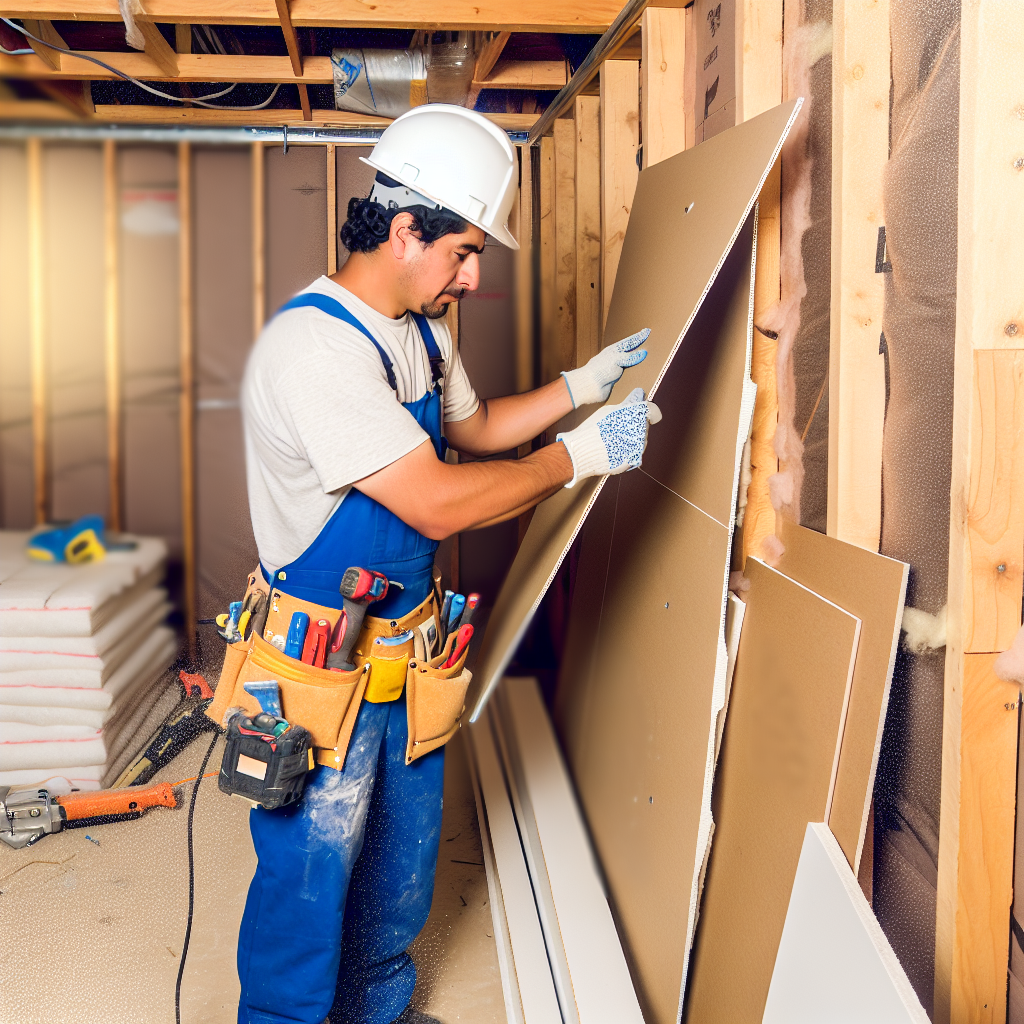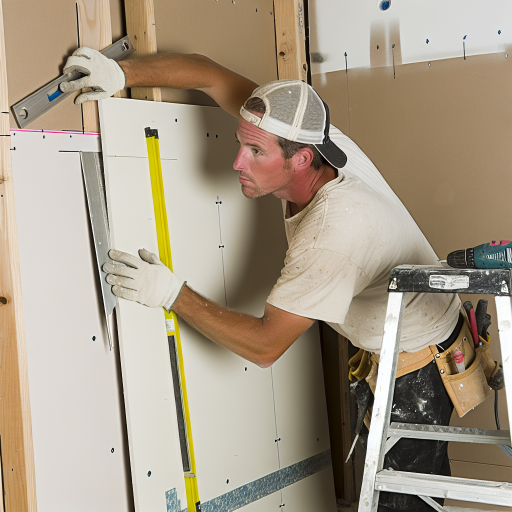Overview of the drywall installation industry
The drywall installation industry involves the process of fixing drywall panels on walls and ceilings.
Importance of drywall installers in construction projects
Drywall installers are crucial in finishing construction projects by providing a smooth surface for painting and other finishes.
Growing demand for skilled drywall installers
As the construction industry continues to grow, the demand for skilled drywall installers is on the rise.
Education and Training Requirements
To become a successful drywall installer, individuals typically need a high school diploma or GED.
This educational foundation is essential for understanding basic math and communication skills necessary for the job.
In addition to a high school diploma, technical training or enrollment in an apprenticeship program can provide hands-on experience in the field.
These programs offer comprehensive instruction on drywall installation techniques and safety protocols.
On-the-job training is also crucial for mastering the skills required to excel as a drywall installer.
Working under the guidance of experienced professionals allows individuals to learn best practices and gain practical experience in the field.
Pursuing relevant certifications can further enhance a drywall installer’s qualifications.
Certifications such as the Certified Drywall Finisher (CDF) designation demonstrate a commitment to excellence and professionalism in the industry.
Continuous professional development is key to staying current with industry trends and advancements.
By attending workshops, seminars, and specialized training programs, drywall installers can expand their skill set and remain competitive in the field.
Investing in ongoing education and training can open up new career opportunities and lead to advancement within the industry.
Employers value employees who are dedicated to improving their skills and staying current with industry standards.
Regardless of where you are in your career as a drywall installer, there are always opportunities to grow and improve.
By prioritizing education and training, you can set yourself up for long-term success in this rewarding field.
Skills and Qualities
- Attention to detail and precision
- Ability to work with a variety of tools and equipment
- Physical stamina and strength
- Problem-solving skills and adaptability
Attention to detail and precision
One of the most critical skills for a successful drywall installer is the ability to pay close attention to detail and work with precision.
Drywall installation requires accuracy and meticulousness to ensure a flawless finish.
Paying attention to even the smallest imperfections can make a significant difference in the overall quality of the job.
Transform Your Career Today
Unlock a personalized career strategy that drives real results. Get tailored advice and a roadmap designed just for you.
Start NowAbility to work with a variety of tools and equipment
A drywall installer must be proficient in using various tools and equipment, such as tape measures, hammers, screwdrivers, utility knives, and power tools.
Being comfortable and skilled in handling these tools is essential for completing tasks efficiently and effectively.
Physical stamina and strength
Physical stamina and strength are essential qualities for a drywall installer, as the job involves lifting heavy materials, climbing ladders, bending, and standing for extended periods.
Having the physical endurance to withstand the demands of the job is crucial for success in this field.
Problem-solving skills and adaptability
Being able to think critically, solve problems quickly, and adapt to changing situations are valuable traits for a drywall installer.
Unexpected challenges can arise during a project, and having the ability to troubleshoot and adjust accordingly is essential for achieving successful outcomes.
Possessing these skills and qualities is crucial for anyone aspiring to become a successful drywall installer.
Continuous improvement and honing of these attributes will pave the way for a fulfilling and rewarding career in this field.
You Might Also Like: How to Create Accent Walls with Bold Colors
Job Duties and Responsibilities
When it comes to being a successful drywall installer, you must be able to handle a variety of tasks with precision and skill.
Here are some key duties and responsibilities that you can expect to perform in this role:
Reading blueprints and specifications
One of the first tasks you will need to do as a drywall installer is to carefully read and interpret blueprints and specifications provided for the project you are working on.
This will help you understand the layout and dimensions of the space, as well as any specific requirements for the drywall installation.
Measuring and cutting drywall panels
Precision is key when it comes to measuring and cutting drywall panels.
You will need to accurately measure the dimensions of the space where the drywall will be installed and then carefully cut the panels to fit.
This requires attention to detail and a steady hand to ensure that the panels are cut correctly.
Installing and finishing drywall
Once the drywall panels are cut to size, the next step is to install them in the space.
This involves attaching the panels to the wall or ceiling using a variety of techniques, such as screws, nails, or adhesive.
After the panels are installed, you will then need to finish them by applying joint compound, sanding, and adding texture or paint to achieve a smooth, seamless finish.
Showcase Your Business Today
Reach thousands of readers actively exploring professional services. Publish your business profile and grow your audience now.
Publish NowRepairing and replacing damaged drywall
In addition to installing new drywall, you may also be responsible for repairing or replacing damaged drywall in existing structures.
This could involve patching holes, fixing cracks, or replacing entire sections of damaged drywall.
It is important to have the skills and knowledge to assess the extent of the damage and make the necessary repairs to restore the integrity and appearance of the drywall.
As a drywall installer, you play a critical role in the construction and renovation of residential and commercial buildings.
By mastering these key duties and responsibilities, you can become a successful professional in this field and build a rewarding career as a drywall installer.
Explore Further: Safety Tips for Painters: Protecting Yourself on the Job
After establishing a successful career as a drywall installer, there are numerous opportunities for career advancement that can take your career to the next level.
Supervisory Roles in Construction Projects
One of the most common career advancement opportunities for drywall installers is moving into supervisory roles in construction projects.
As a supervisor, you will be responsible for overseeing the entire drywall installation process.
You will manage a team of installers and ensure that projects are completed on time and within budget.
Specializing in Specific Types of Drywall Installation
Another career advancement opportunity for drywall installers is to specialize in specific types of drywall installation.
By focusing on a niche area such as acoustic panel installation, fire-resistant drywall installation, or decorative drywall finishes, you can differentiate yourself from other installers.
This specialization can allow you to demand higher pay for your specialized skills.
Starting a Drywall Contracting Business
If you have accumulated significant experience and expertise in the field of drywall installation, you may consider starting your own drywall contracting business.
As a business owner, you will have the flexibility to choose your projects, set your rates, and build a team of skilled installers.
Teaching or Mentoring Future Drywall Installers
For drywall installers who are passionate about sharing their knowledge and experience, a career in teaching or mentoring future drywall installers can be a rewarding choice.
By passing on your skills to the next generation of installers, you can help shape the future of the industry.
Moreover, you can give back to the community.
The field of drywall installation offers a wide range of career advancement opportunities for those who are willing to work hard.
Whether you choose to move into a supervisory role, specialize in a specific area, start your own business, or become a mentor, numerous paths can elevate your career in this dynamic and in-demand industry.
Gain More Insights: Innovations in Masonry Materials and Technology

Challenges:
Being a drywall installer requires physical strength and stamina to lift and place heavy sheets of drywall.
Drywall installers may need to work in tight spaces or extreme temperatures, which can pose challenges.
Rewards:
The construction industry is always in demand, providing stable employment opportunities for drywall installers.
Drywall installers get to witness the transformation of a space as they complete each project.
While there may be challenges to overcome in the career of a drywall installer, the rewards of job stability and personal satisfaction can make it a fulfilling and successful career choice for those who are up for the task.
Discover More: Ironworker Salary Expectations and Career Growth
Earning Potential
As a drywall installer, understanding the earning potential in this field is crucial for your career growth.
Below are key points to consider when it comes to the financial aspect of being a successful drywall installer.
Median salary for drywall installers
The median salary for drywall installers can vary depending on factors such as experience, location, and employer.
According to the Bureau of Labor Statistics, the median annual wage for drywall installers was $46,270 in May 2020.
Factors that affect salary levels
Several factors can influence the salary levels of drywall installers.
These factors include years of experience, level of expertise, certifications, geographical location, and the size of the company you work for.
In general, more experienced drywall installers tend to earn higher salaries compared to entry-level workers.
Opportunities for overtime or freelance work
Another way to increase your earning potential as a drywall installer is by taking advantage of opportunities for overtime or freelance work.
Many construction projects require working extra hours, especially during tight deadlines.
By working overtime or taking on freelance projects, you can earn additional income above your base salary.
Benefits packages and union membership
Some drywall installers have the option to receive benefits packages as part of their employment.
These benefits may include health insurance, retirement plans, paid time off, and other perks.
Additionally, joining a union can provide you with access to higher wages, better working conditions, and more job security.
Showcase Your Business Today
Reach thousands of readers actively exploring professional services. Publish your business profile and grow your audience now.
Publish NowA successful drywall installer can enjoy a competitive salary and various opportunities to enhance their earning potential through overtime, freelance work, benefits packages, and union membership.
Key Takeaways for Aspiring Drywall Installers
After diving into the world of becoming a successful drywall installer, it is essential to recap the key points that have been covered.
First and foremost, always remember the importance of gaining hands-on experience in the field. Practice makes perfect.
Secondly, networking is key in this industry. Building relationships with contractors, suppliers, and other professionals can open up opportunities.
For aspiring drywall installers, do not be discouraged by the challenges that may arise. Stay dedicated and persevere through the learning process.
Furthermore, continuously seek opportunities for further research and exploration. Staying up-to-date with industry trends and innovations can set you apart.
Lastly, never underestimate the value of continuous learning and professional development. Invest in yourself by attending workshops, acquiring certifications, and honing your skills.
Becoming a successful drywall installer requires dedication, hard work, and a commitment to growth. Keep pushing forward, and success will follow.
Additional Resources
How To Become A Contractor (Becoming Your Own Boss) | Rich …
Where is the real money in construction as a career? : r/Construction
[E-Books for Sale]
The Big Book of 500 High-Paying Jobs in America: Unlock Your Earning Potential
$19.99 • 500 High-Paying Jobs • 330 pages
Explore 500 high-paying jobs in America and learn how to boost your career, earn more, and achieve success!
See All 500 High-Paying Jobs of this E-Book
1001 Professions Without a Degree: High-Paying American Jobs You Can Start Now
$19.99 • 1001 Professions Without a Degree • 174 pages
Discover 1001 high-paying jobs without a degree! Unlock career tips, skills, and success strategies for just $19.99!




